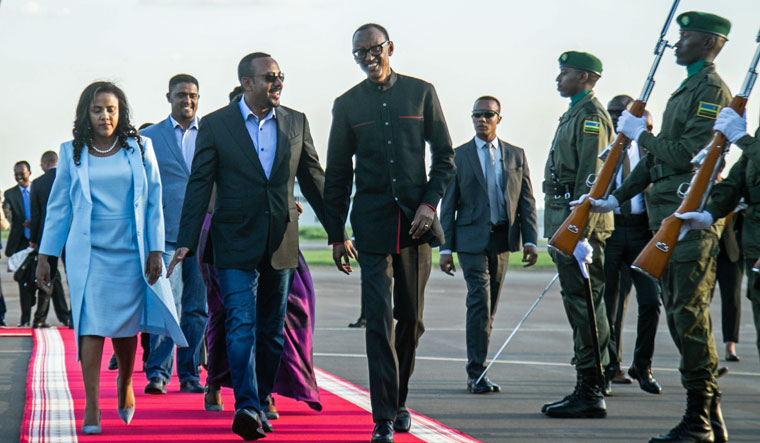It has been 25 years since over 800,000 people were slaughter in a genocide in Rwanda. The country marked the beginning of 100 days of mourning for all the lives lost in the horrific incident.
President Paul Kagame will start a week of commemoration activities by lighting a remembrance flame at the Kigali Genocide Memorial, where more than 250,000 victims are believed to be buried, mainly from the Tutsi people.
also read
- Refugee who left the UK for holiday stranded in Africa for 16 years
- Why India's decision to have defence attaches in African countries makes strategic sense
- Which country recently passed stringent anti-LGBTQ bill? Find out here
- Haldwani violence: Death toll rises to 6; situation brought under control, say police
- Alec Baldwin pleads not guilty to involuntary manslaughter charge
Hutus, the dominant community in Rwanda turned on the Tutsi community, whom they considered traitors, killing people from the community over a period of 100 days. They killed quite a few from the Hutu community too, moderates who opposed killing of Tutsis to begin with.
The attack began on April 7, 1994, the day after the assassination of President Juvenal Habyarimana, a Hutu. After lighting the flame, Kagame is expected to make a key speech at the Kigali Convention Centre, a dome-shaped auditorium in the centre of the capital, a modern building emblematic of the regeneration of Rwanda since its dark days in 1994. The perpetrators and survivors now live side by side and have helped regenerate the state over the years.
During the genocide, political and military leaders even encouraged rape to further destroy the ethnic minority. It did to an extend, for rapes and gang-rapes suffered by women led to spread of AIDS. Children born out of the assaults were stigmatized as “children of the killers.” The minority group now form just 14 per cent of the population.
To mark the anniversary of the genocide, Kagame will then preside over a vigil at the country's main football ground. Over the years, the east African nation has recovered economically, but the trauma still casts a dark shadow.
Some 10 leaders are expected to pay their respects, mostly from nations across the continent. Former colonial ruler Belgium is sending Prime Minister Charles Michel. But French President Emmanuel Macron is not attending, with France represented by Herve Berville, a 29-year old Rwandan-born member of parliament in Paris. Rwanda has accused France of being complicit in the genocide through its support for the Hutu-led government and of helping perpetrators escape.
Paris has consistently denied complicity in the bloodshed, though former president Nicolas Sarkozy in 2010 acknowledged France had made “serious errors of judgement”. On Friday, Macron appointed an expert panel to investigate France's actions at the time.


